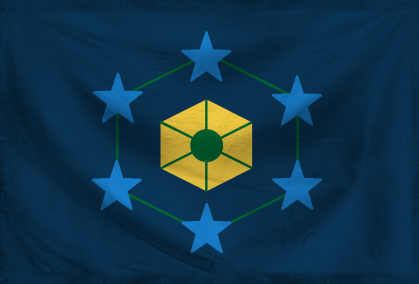
First and foremost, hello and welcome to the Future Tech Voluntary Star-State Index, or VSSI for short. The following thread is an attempt to provide an optional or otherwise non-mandatory index of FT players and their nations. The goal of this project is to provide an easily accessible catalogue of national information; including government type, relevant cultural information, and relative location as defined by the galactic quadrant system (ie: Alpha, Beta, Delta, Gamma) for nations who consider themselves members of the FT-Prime canon. Participation in this thread is in no way mandatory for inclusion in the greater FT-Prime canon, nor does this thread seek to provide a basis to exclude or otherwise define who is and who is not a member of FT-Prime.
In saying such, the VSSI does not operate on a “by-application” inclusion method, but instead simply provides a framework which players may choose to use in defining their nation. Continuing this, as the OP of this thread I will be curating as opposed to moderating any and all posts. Any player that chooses to provide their national information will be added to the greater index (with one exception mentioned below). That being said however, inclusion in the index does not necessarily guarantee that your nation is recognized as canon by other players who have also submitted their information for inclusion in the VSSI. Only through cooperation and discussion can players absolutely confirm the existence of their nation in regards to another player’s established canon.
The only rule of the VSSI, is that players refrain from mentioning the existence of other player’s nations in their excerpt. This is to prevent the VSSI being used as a guidelines to define who is or who is not canon in the greater FT-Prime continuity.
In conclusion, it is my hope that the following index proves a useful tool that players can use to learn about each other’s nation, and also provides a framework that allows players to formulate role-plays with one another. All entries are listed by shorthand nation name alphabetically, with names linking to the submitting player's post in the thread.
Suggested Information:
While there are no enforced guidelines as to what can or cannot be included in a nation’s index entry, so long as the entry follows the one rule listed above, I have seen fit to provide a general list and short description of information that I suggest is included. It is as follows:
Official National Name: The official name of your nation, as defined by your national government. It is suggested that the player provide the name in the language of their nation, with translation in brackets. For example: Hasmi Katti Šittar Šiun (The Kinsmen of the Star God). For nations organized that do not define their entities as nations (ie: some warbands, migratory fleets or etc.) Marking N/A is suggested.
Short National Name(s): The nickname(s) or otherwise common usage name(s) of your nation. If the player has an established shorthand name for their nation in their own language it is suggested that it is presented with the translation following in brackets. For example: The Uthanium, The Uthani Imperium
National Government Type: The best definition for the structure of governance your nation has in place, as well as the driving ideological force behind it if pertinent.. For example: Hereditary Autocratic Monarchy: Rexist Political Theory.
Prevalent Sentient Species: A list of prevalent, sentient, species that reside in your nation. Simply providing a list is acceptable, but if applicable it is suggested that the submitting player provide follow up information on any species that is not human. This can include a general physical description, a detailed biological breakdown, or whatever the submitting player prefers including links to pictures or otherwise. (It is requested that any pictures be either linked directly to or placed in spoilers so as to avoid clutter.)
Important Cultural Information: A blurb about the general culture of your nation. Players can be as specific or vague as they choose, with potential entries ranging from a broad overview of the customs, traditions and habits of their people to the cultural-analogue that the player has chosen to base their nation around.
Galactic Quadrant Location: The quadrant (Alpha, Beta, Gamma, Delta) that the player has chosen for the location of their nation. Players are free to describe their general location (ie: Northeast Gamma Quadrant, Northeast Gamma Quadrant: Syndicate Arm etc.) But it is required that positioning of a player’s nation in relation to another player's nation, be refrained from mention. This is to prevent the idea that the index defines who or what is or is not canon.
Factbook Link: A place for players to provide a link to their factbook if they have one.
To clarify, the above is simply a suggested format that the player may use if they so desire. So long as player’s excerpts adhere to the VSSI’s single rule, they are acceptable and will be added to the index.







